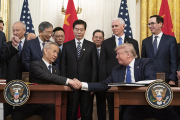
President Donald Trump is set to sign an executive order on Wednesday that will prevent individuals assigned male at birth from competing in women’s or girls’ sports.
The move marks another significant shift in federal policy toward transgender rights under Trump’s second administration. Last month, on his first day back in office, he issued a sweeping order defining sex strictly as male or female, requiring this definition to be reflected in official documents, such as passports, and policies, including federal prison assignments.
A Politically Charged Issue
Trump’s campaign found that his stance on restricting transgender participation in sports resonated with a broad voter base. According to AP VoteCast, more than half of surveyed voters believed government support for transgender rights had gone too far. He made this issue a focal point of his platform, vowing to end what he called "transgender insanity," though his campaign provided few specifics at the time.
The new executive order coincides with National Girls and Women in Sports Day and will dictate how the administration interprets Title IX, the landmark law that promotes gender equity in athletics and addresses sexual harassment in schools.
“This executive order restores fairness, upholds Title IX’s original intent, and defends the rights of female athletes who have worked their whole lives to compete at the highest levels,” said U.S. Rep. Nancy Mace, a Republican from South Carolina.
Shifting Interpretations of Title IX
Each administration has exercised its authority to shape Title IX’s interpretation. Under Trump’s first term, then-Education Secretary Betsy DeVos narrowed the law’s definition of sexual harassment and limited the circumstances under which schools were required to investigate claims.
The Biden administration later reversed those policies, expanding protections for LGBTQ+ students and increasing safeguards for victims of campus sexual assault. However, Biden’s policies stopped short of specifically addressing transgender athletes, leading to ongoing legal battles. Several Republican-led states challenged the administration’s Title IX changes in court.
Duke Law School professor Doriane Lambelet Coleman suggested Trump’s order simply returns to a traditional reading of the law.
The NCAA’s Struggle for Clarity
The National Collegiate Athletic Association (NCAA) has faced difficulties navigating a patchwork of state laws regarding transgender athletes, often under the threat of lawsuits.
“We do have a situation where there is no clarity on this from a legal point of view,” said NCAA President Charlie Baker in a January interview. “You have federal judges ruling on individual cases. You have 26, 27 states with one set of rules—a bunch of other states with a whole other set of rules. I do think we would welcome some clarity somewhere on this so everyone has a general understanding about what the rules of the game are.”
A source familiar with discussions within the NCAA told ESPN that the association does not oppose the executive order and sees it as an opportunity for clearer federal guidance.
The Impact on Transgender Athletes
It remains uncertain how the order will affect transgender athletes, as their numbers are difficult to quantify.
Critics argue the policy is less about fairness in sports and more about limiting transgender rights.
“This was never about trans athletics, science, or ‘fairness.’ It has always been about oppression,” said Sadie Schreiner, a transgender track and field athlete at Rochester Institute of Technology. “They’ll attack me all the same whether I’m on or off the track, so the only way I’ll stop competing is in handcuffs.”
Previous reports suggest transgender athlete bans address a largely theoretical issue. A 2021 Associated Press investigation found that many states passing such laws could not identify cases where transgender participation had created competitive concerns. In Utah, for example, legislators overrode a veto to ban transgender athletes despite only one known transgender girl competing in K-12 sports at the time.
“This is a solution looking for a problem,” said Purdue University professor Cheryl Cooky, who studies gender and sports.
Regardless of their numbers, transgender athletes continue to be at the center of a heated national debate. Cases such as Lia Thomas’ participation in NCAA swimming or San Jose State’s volleyball season have fueled ongoing controversy, drawing significant attention to the issue.
As Trump signs this executive order, the implications for transgender athletes, schools, and sports organizations remain to be seen. However, it is clear that the debate over fairness, inclusion, and rights in sports is far from over. Photo by Gage Skidmore, Wikimedia commons.











































